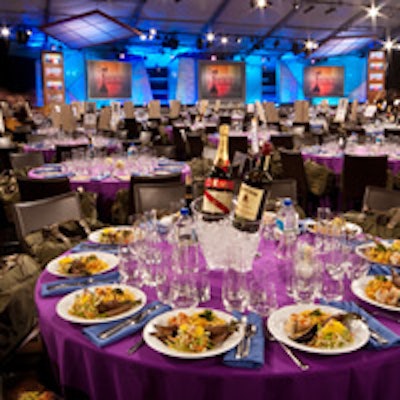
It stands to reason, especially given the troubled U.S. economy, that uneaten food should be donated to needy people after events—particularly when standard catering protocol can include the preparation of 10 percent more food than needed for the expected guest count. But event professionals close to the issue know that it’s not just a humanitarian matter. Donation of leftover food includes logistic challenges and other potential obstacles. For some people, donation is worth the effort at all costs—but others aren’t convinced it’s always a viable option under the current circumstances.
In an effort to encourage the practice, California state senator Jenny Oropeza of Long Beach proposed legislation, Senate Bill 1443, early last year. The bill would have required caterers to inform clients they have the option of donating uneaten food, but the California Restaurant Association opposed the measure on the grounds that it would be inconvenient for its members, and it was eventually killed. In December, Oropeza reintroduced the idea as SB 35, with language still being written. The first hearing on the bill is April 21 before the senate committee on food and agriculture.
“We believe [the logistics] can be worked out if reasonable minds are sincere about achieving the goal of usable foods being donated instead of going into a landfill," said Oropeza’s Sacramento-based press officer, Ray Sotero. "In these economic times, people need a little extra help and need food on the table.”
Some local caterers are already donating leftovers. Along Came Mary has been doing so for more than two decades, and estimates leftovers from about 75 percent of its events make their way to charities. “It’s the right thing to do—to give when we have so much to offer. It’s a challenge, but hands down, we always feel it’s worth the extra work and effort,” said the company’s vice president of catering and executive chef, Bill Starbuck. “Anything to put so much of the waste from these events to a better use is something we support."
Others in the industry say the options and processes currently available for donating food after events makes the task daunting, if not effectively impossible.
“We should be doing it, but my sense is that everybody's afraid of the liability," said Russell Harris of the Russell Harris Event Group. "They're afraid of being sued. We live in the land of lawsuits.” In truth, businesses are protected from lawsuits under the Good Samaritan Law, should someone allege an illness from donated meals.
Then there is the matter of food that may not be fit for donation. “Sometimes food should be thrown out, like perishable foods that have been sitting out at the event. Do we really want to be donating our spicy tuna rolls?” said Joel Boardman of Food Fetish. “It's hard to paint this with a broad stroke. Do we want to help people? Of course. It’s just not that simple.”
Another impediment is that many would-be donors simply don’t have the information about which organizations accept food donations, and don’t know where to find it. “Nobody knows where there's a list of who would or wouldn't take it,” said Harris, who so far has not implemented a standard donation practice. “There are so many caterers out there that turn out the best food in Los Angeles, where we have events every single night of the week—it could feed hundreds of people the next day. There’s got to be a way.”
Along Came Mary works with charities such as Angel Harvest, the Los Angeles Mission food bank, and the Good Shepherd Shelter, several of which proactively reach out to the firm to let it know they can accept donations. The El Portal Theater has given its leftovers to Project Angel Food. “They came promptly, so it was gone by noon [the next day]. We over ordered and it was great to know it was going somewhere,” said the theater’s Pegge Forest. “If you make the right phone call and get to the right person at the right organization, you can make it work.”
Salvation Army media and communications manager Robert Brennan says his organization does not accept leftover food from events and restaurants, but points out that 95 percent of its social service sites have reported an increase in new clients who have never asked for help in the past—underscoring that need is at a critical level.
Another significant logistic issue—particularly relevant at a time when planners may be forced to painstakingly streamline their whittled budgets—is that sometimes, even if a food-accepting organization can be identified, it can not pick up food immediately after the event ends. “We’ve had [a situation] before where we've called up and said, ‘Hey, we have some food, do you want it?’ And [the recipient org has said], ‘Sure, we'll come pick it up in four hours.’ Well, we're not going to be there. It would cost money [to keep staff on site].” said Boardman. “It’s a good idea—it's just not always feasible, especially right now. I’m not going to keep three guys here for an extra hour at an extra cost so we can donate food. Our budgets don't have that kind of money in them right now to incur those extra costs. There are some [charities] that are good about it and some that are not so good. They don't show up and they don't call.”
Los Angeles Times columnist David Lazarus, who wrote about the subject in a March 25 opinion piece, said a bridge between donors and recipient organizations would be the answer. “After hearing from both caterers and nonprofits, I'd say the real issue here is arranging for some intermediary service that will pick up food at appointed times and deliver it to recipients. This would require the caterer to at the very least reach out and make the food available, and for the nonprofit to book the pickup and delivery.”
To those who would oppose Oropeza's bill, Tami Mahnken-Shelly of Greenlight Designs said, “Why deny someone the option of providing existing resources to those in need—especially when it costs them nothing to do so? When you consider that this is merely an option and not mandatory for vendors, by all appearances, it makes their position seem cruel and shortsighted.”



















